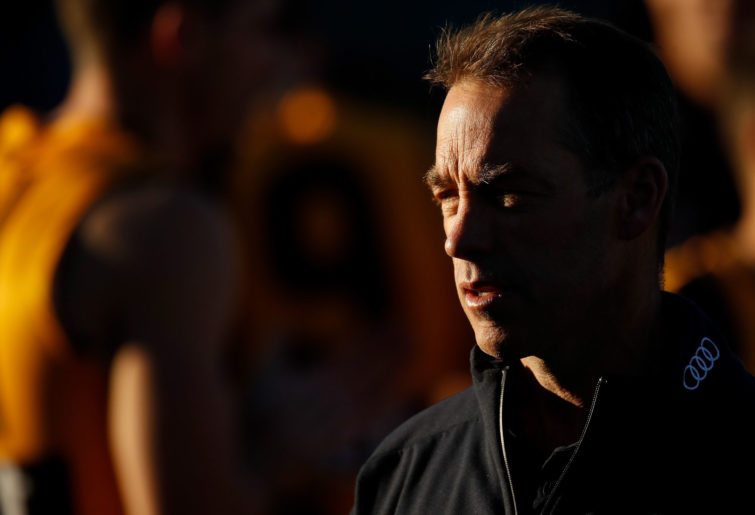It does not take much to send the AFL’s content-hungry media cycle into a spin, and this week it’s comments from Alastair Clarkson following his side’s narrow victory over North Melbourne that have dominated the discourse.
Clarkson said the game was in a “dreadful place” if the spectacle put forward on Sunday night is indeed what the AFL is trying to create, and put the blame on umpires’ reluctance to pay free kicks for holding the ball.
Specifically regarding holding the ball, Clarkson claimed that “we’re just not paying the free kick, yet we’ll do one for tiggy-touchwood ruck or marking infringement.”
Now, to be fair, the match was a long way from being a good spectacle.
For the most part the ball went back and forth in Hawthorn’s forward half, with their marking forwards’ slippery hands matched only in failure by the North Melbourne half-backs’ inability to clear the ball out of defence.
But only the most naive of fans – or, for that matter, AFL administrators – could read Clarkson’s comments as a genuine plea to improve the quality of the game.
Senior coaches do not serve the game, they serve their clubs, and when they argue for changes in rules, interpretations or umpire behaviour, the suggestions they make cannot ever be disentangled from that first and most important allegiance.
It is no coincidence that Clarkson’s comment potting “tiggy-touchwood ruck infringements” came after a game where his ruckman, Jonathon Ceglar, gave away six free kicks and the opposition ruckman, Todd Goldstein, received five.
Whenever the TV cameras panned to Clarkson in the coaching box, he appeared to be marching about with barely-restrained frustation and fury. One can only imagine the nervousness felt by the wall plaster.

Alastair Clarkson (Photo by Michael Willson/AFL Media/Getty Images)
Comments like Clarkson’s – especially at this point in history – should be met with nothing but an eye-roll from AFL House, and perhaps a refrain of “righto mate, if you hadn’t noticed, we’re trying to navigate a pandemic here.”
Instead, Gillon McLachlan publicly agreed with Clarkson that umpires should pay holding the ball free kicks more often, and suggested he might put in a call to Steve Hocking – the AFL’s football operations manager – to take some kind of action on the issue.
Overall the story possess the same odious stink of Clarkson’s ‘coffee catch-up’ with McLachlan in 2018, where the Hawthorn coach bemoaned of a lack of free kicks paid for blocking after a loss to Sydney.
Oh, to support a club where the coach has gravitas enough that should he feel his side isn’t being paid enough free kicks, or the opposition too many, he can simply speed-dial the CEO and have a new interpretation of the rules in the works post-haste. It must be nice.
As for the laundry list of possible rule changes that have been proposed by all and sundry in the media in the 48 hours since Clarkson’s comments, they fall into one of two categories.
The first is the rule changes that sound like a good idea to an ’80s football purist, but belie a lack of understanding of the modern game, and wouldn’t have even a brief impact on scoring.
A classic example is the suggestion that a mark should not be paid to players who receive the ball from a backwards kick, and they should instead be forced to play on.
This was taken down brilliantly in a tweet from Rob Harding, who has worked as an opposition analyst and strategy coach at four different clubs.
Even if a change like this did produce some kind of an improvement in scoring, can you imagine the sheer volume of hair that would be torn out over the umpires’ judgments of whether or not a kick had travelled backwards?
If play being halted half a dozen times per game for an inconclusive ARC review on that matter is your idea of a good spectacle, then by all means put this one into action.
The other category is those rule changes that may actually see scoring increase for all of one or two quarters before teams adjust their gameplan and the status quo is restored.
The 2018 rule making it easier to play on out of the goalsquare after a behind is kicked is a classic example – perhaps in the first half of some preseason games it may have put the ball further out of defence and increased a team’s odds of scoring, but before the matches were halfway done the defenders realise they need to position themselves further back, and we find ourselves back where we started.
The theory behind all rule-change suggestions seem to be that they will simply block off a tactic used to slow down the game, and that coaches and players will then opt to play a more risky and offensive style of football instead.
The reality is that coaches and players are great innovators – they want their teams to defend well because it gives them more control over the game, and no matter what rules you put to them, they will continue to do just that.
If anything, the annual and sometimes mid-season introduction of new rules and interpretations just means that coaches must spend more time revising and updating their defensive tactics and have fewer minutes remaining to spend on looking for ways to play attacking footy.
Believe it or not, most coaches want to find ways for their players to get more space on the field and kick more goals – and if they don’t have to be constantly reeling from new rule changes, they just might have time to nut it out.
If we’re looking at a strategy to increase scoring, the best move would be a five-year moratorium where the league agrees not to make any rule changes, and see if coaching and the game can evolve naturally when given some breathing space.
I understand there are many out there who’d love to engineer a return to past eras where triple-digits regularly appeared in both a team’s matchday score and a key forward’s season goal tally, but the Pandora’s box of zone defences and high-pressure footy has spent a long time open and cannot be closed.

Lance Franklin (Photo by Ryan Pierse/Getty Images)
We can no more take footy back to those times than we can the pre-VFL 19th century era, where the match was won by the first team to kick two goals and the captains made a gentleman’s agreement not to station any of their side’s players forward of the ball.
Let me leave you with a brief excerpt from the Football Record of Round 1, 1914 – nestled in among advertisements for Craig’s Overcoats and Renardi Sweet-Toned Pianos – concerning what was said by then VFL president Alex McCracken at the league’s anual meeting:
“McCracken referred to the oft-heard remark, ‘The game and the player of the old days were better than they are now.’
“It always seems to me when I hear a statement like that it is merely the opinion of men who take no interest in the game as played nowadays, and that their knowledge of football has been carried no further than it was in the days when they were young.
“Mr McCracken has not allowed himself to become a has-been, and at the annual meeting of the league he said that the game is better played now than ever it was.
“It is more strenuous, and the players have to be more fit, as they have made it more of a business than it was in the old days.”
Here we are, still having the same debate along the same battle lines 106 years later.
Some things never change.






























































































